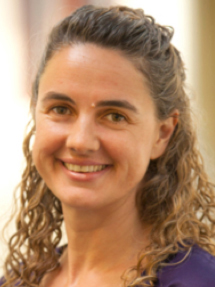Junior Faculty Teaching Fellow Spotlight: Anita Disney
Each month, the CFT Newsletter highlights the work of our Junior Faculty Teaching Fellows. This month, Anita Disney, Psychology, talks about her teaching philosophy and interests.
Anita Disney
For many of our students, college will be their last engagement with structured learning. From the point of graduation forward, the extent to which we grow and integrate new ideas – arguably our ability to remain informed participants in society’s decision making processes – depends in large part on the extent to which we have become independent learners. I see college as an opportunity to facilitate a transition from a state in which learning is a process that happens to us, to a state in which learning is a skill set to be deployed. My goal as a classroom teacher and research mentor is to gently paint myself out of the picture, to produce lifelong learners who no longer need me as they build scaffoldings for new knowledge. Gently is important here, students vary in the extent to which they are ready to take ownership of their learning. One of the challenges I have faced is finding a balanced sweet spot between classical instruction and more student-centered approaches. This balancing is a work-in-progress, particularly in group instruction.
Consistent with the value I place on learning how to learn, I think of teaching (in the classroom and lab) as structured co-learning; everyone in the room is learning, myself included. One way I can be valuable to the process is as a model of a lifelong learner. I present myself not as a polished repository of knowledge, but as a professional learner, skilled in the art of asking and finding answers to questions. Yes I do know a lot of stuff these days, but that’s a side effect of what it means to me to be an academic and a scientist. I am curious by profession. I am not sure it does a service to students to conceal the crucial roles that not-knowing and knowing-how-to-find-out, play in my professional life. So I am an open co-learner in the classroom. My position is distinct in the room for having the privilege of allowing my current understanding of the material to (hopefully temporarily) provide the scaffold for everyone’s learning.
At the undergraduate level, I teach Drugs and Behavior and will soon be launching a new Lab in Neuroscience course. In these classes I take a skills-based approach, which is common nowadays, as it should be. I try to model the cognitive behaviors and skills I want to build in others; a questioning mind (which can be as simple as posing clear questions at the start of a week or a class), an openness to new ideas (bringing in material that’s new to me, from wide sources), a fearlessness in the face of (actually outright enjoyment of) unknowns, a deep comfort with finding – more than knowing – answers. A technique I use often in the classroom is actually one I learned from my grandmother; she would rarely answer a question, instead she would ask “Where (or How) could we find that out?” I name this in the classroom as a conscious strategy (and I credit my grandmother with its origin, I also recall and name the frustration it often yields).
I am also deeply interested in issues of access to education. My commitment to access has brought me to my newest pedagogical interest – Universal Design for Learning (UDL). I appreciate the way that this framing takes traditional accessibility/disability issues and expands them to look at the broad issues of inclusivity in the classroom. This is a new endeavor for me and my intuition is that there exists (either actually or potentially) an important and even broader application and interpretation of these principles than the ones I have encountered so far. I found UDL because I take a lifelong learning approach to teaching too. I am early in the process of developing my teaching skills, and I seek not the Right Way, but a toolkit of great ways to share my love for learning and my understanding of the skills that enable one to put that love into action.


Leave a Response